Why Do Cats Vomit? Should I Be Concerned?
28.04.2022.
Frequent or severe vomiting in cats is not natural, and it could be an indication of a more serious problem than an upset stomach. If your cat gets sick, the first thing you'll ask yourself is whther the cat is fine and "Why is my cat vomiting?" Here are the main things our team of vets wants you to know.
Is it common for cats to vomit?
A cat's tummy can be disturbed for many different causes, just like ours. An allergic reaction to food, viruses, parasites, or more severe illnesses like cancer or organ disease is some of the most prevalent causes of an upset stomach in cats.
If your cat vomits more than once a month or continues vomiting, it's time to take your pet to the vet to find out what's causing the vomiting.
RELATED: Can Cats Have OCD? Here's What Your Vet Wants You To Know
Cat vomit types
Cats can vomit for various reasons, and the look of the vomit will alter based on the cause of the vomiting.
Cat owners are familiar with hairballs, which are formed when a cat ingests a considerable amount of hair during grooming. Since the digestive system cannot absorb hair, it must be vomited out of the body.
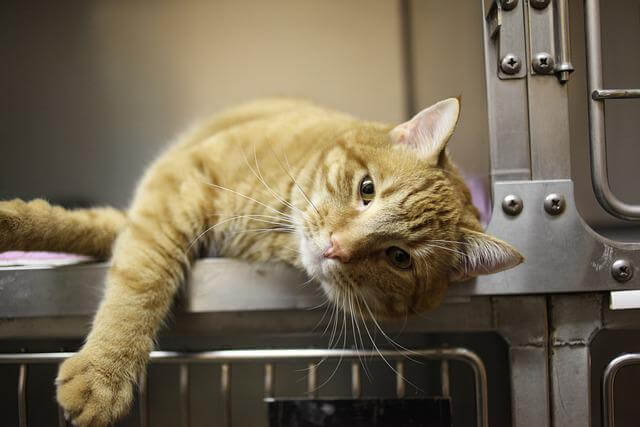
Blood, bile, mucus, or partially digested food may also be found in vomit from more severe causes. Your cat's vomiting frequency, appearance, and timing are all things you should tell your vet that can help them make a diagnosis.
There is some difference between regurgitation and vomiting. It is something pet owners should know how to differentiate.
Regurgitation can be described as the uncontrolled expulsion of contents, but those contents never reach the stomach. They come from the cat's throat, mouth, and esophagus. Vomiting is the uncontrolled expulsion of the content that comes from the cat's stomach or upper intestinal tract. Vomiting can persist anywhere from a few seconds to several minutes. The cat may show signs of illness such as lethargy and abdominal pain, drooling, retching, and heaving.
RELATED: Is Your Cat Panting? Here's What It Might Mean
In contrast, regurgitation occurs mostly unpredictably, and there is no warning of it. In most cases, the cat is perfectly fine one minute and then "spits up" without typical vomiting signs like retching or heaving. Your vet can limit the possible reasons for the condition by determining whether your cat is vomiting or regurgitating.
Why is my cat vomiting?
This is one of the first questions most cat owners have when their cat vomits. In most cases, cat vomiting is not something you should be too worried about. Here are some of the possible causes why cats vomit.
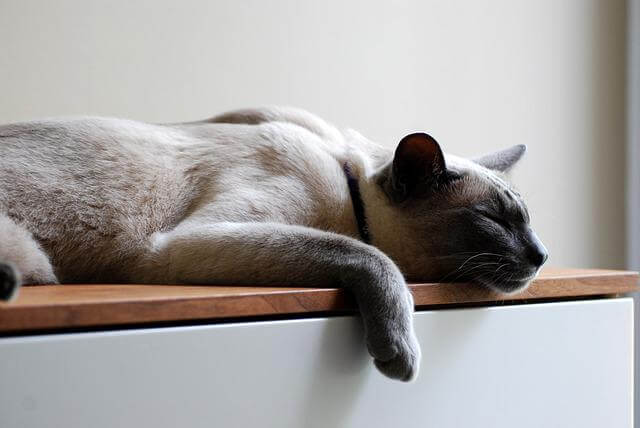
Hairballs
Because of the cat's self-grooming, your cat's stomach can get stuffed with hair. In long-haired cats and those that groom themselves excessively, hairballs are more likely to occur. When your cat is trying to vomit hairballs, you may hear hacking noises and feel spasms.
RELATED: How Long Can a Cat Go Without Eating? When To Visit Your Vet?
Hairballs are usually easily brought up by cats, but if your cat has trouble doing so, it's time to see the vet. Hairballs can sometimes become stuck and cause intestinal obstructions, which can be dangerous if not treated promptly.
Eating too fast and too much
It's not uncommon for cats to vomit if they eat too much food too rapidly. Several interesting cat dishes are available to assist in reducing your cat's eating speed and help prevent eating problems that come from eating quickly and result in vomiting.
Hairballs and other digestive tract obstructions, dehydration, and problems with the esophagus are all possible causes of vomiting after a meal. A trip to the doctor is in order if your cat repeatedly vomits after eating.
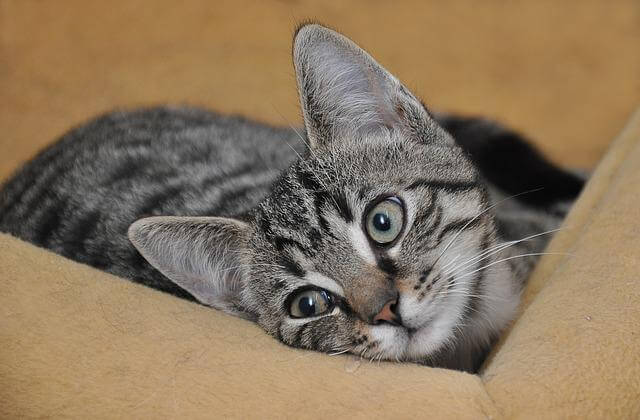
Severe health conditions that can cause vomiting:
Although it may be tempting to dismiss your cat's vomiting as normal cat behavior, there are several severe health conditions that include vomiting as a symptom, and it is vital cat owners know them. The following are the more severe and worrying causes of vomiting:
- Poisoning
- Foreign bodies in the intestines
- Parasites in the intestine
- Food intolerances
- Diabetes
- Hyperthyroidism
- IBD
- Metabolic Issues
When should I take my cat to the veterinarian?
Avoid giving any food to your cat for at least 12 hours if they're infrequently vomiting. To make sure your cat is hydrated throughout this fast, provide them with ice cubes every 30 minutes or so. If your cat's vomiting has ceased after 12 hours, you can gradually resume regular feeding.
RELATED: Cat Drooling: What It Means and Should You Worry?
You should contact your veterinarian promptly if vomiting is frequent. You should seek immediate medical attention if your cat continues to vomit excessively. If your cat exhibits any of the following signs, contact your veterinarian:
- Persistent vomiting
- Vomit that had blood in it
- Lethargy
- Fever
- Pain
- Distress
- Bloody diarrhea
Diagnosis
It may sound a bit gross, but it's a good idea to bring a sample of your cat's vomit to the vet when it's time to visit them. The sample can be examined by your veterinarian to help discover what's wrong with your cat's stomach.
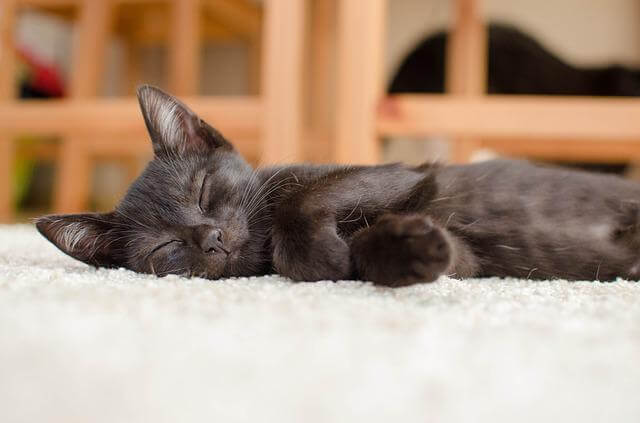
Samples of vomit can reveal a variety of information, such as:
- Your cat may have an inflamed intestine if it has a lot of mucous in its vomit.
- Your cat may have an intestinal obstruction if its vomit smells strongly of rotting food.
RELATED: What Does Blood in Cat Stool Mean?
Treatment
The treatment for vomiting in cats will depend on the condition's underlying cause. You may be able to treat your cat's symptoms by temporarily withholding food, or they may need to have surgery or chemotherapy. You can never be sure until you look for the things we mentioned and make sure you keep an eye on symptoms. In any case, it is best to call your vet and see if there's anything you can do.
World Cat Finder Team

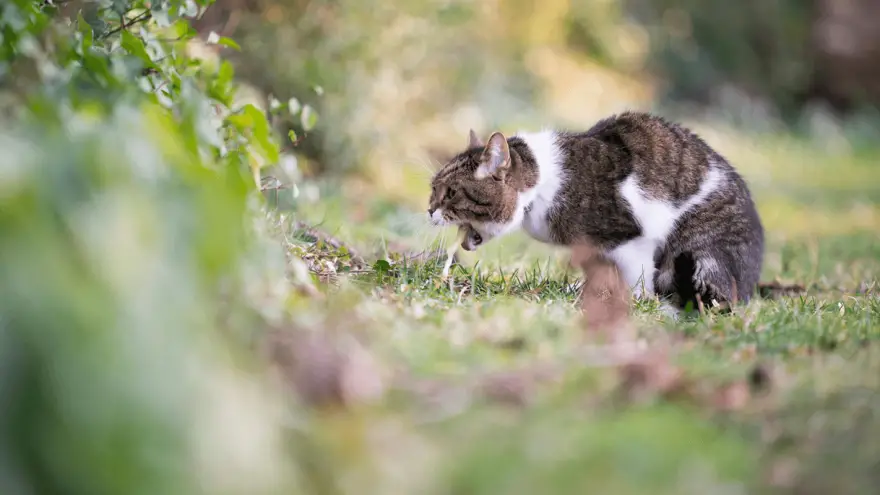

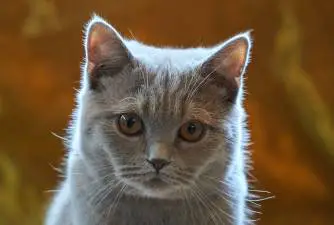



Share